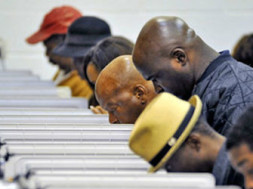
Black Jobs, Unemployment and Answers to these Pressing Problems
 By Lazone Grays – It has been some time since I wrote about this issue and after watching clips of recent Black leaders I find it necessary to weigh in on this very important and pressing issue. I mean, there is the national perspective, but what about the local and state discussion on this very same issue?
By Lazone Grays – It has been some time since I wrote about this issue and after watching clips of recent Black leaders I find it necessary to weigh in on this very important and pressing issue. I mean, there is the national perspective, but what about the local and state discussion on this very same issue?
Jobs – or the lack of – is on the minds of all Americans and the statistics show that the plight regarding Black unemployment and the poverty it perpetuates is ongoing. Viewing the numbers, Black Kansans are not faring well, and have not fared well for over a decade. We are passionate about standing up, speaking out and voicing concern regarding e-Verify, dismantling human relations departments, attacks on single well-paid persons losing their job and at best these have been reactionary to recent events, but where is the focused discussion regarding the elephant in the room and the proactive steps needed to take it out?
I personally believe the time has come to have a open, honest and frank discussion with ourselves about the systematic problem and most importantly, what can Black folks (not minorities or peoples of color) do on our own to begin to address this travesty in earnest? How long can we as Black folks deny ourselves the conversation and sit comfortably in the bleachers while we get pummeled on the playing (battle) field? And don’t tell me the conversation is going on in the Black church or the answers or actions addressing the problem are coming from there as well. At best, it has become a money pit that serve the few and looks past and ignores too many. It seems that answer to all is Prayer.
Silence on the issue has created more statistically significant unemployment, incarceration, welfare receipts and poverty; not less. Silence has done Black youth no good regardless of how many more Black Americans receive MBA’s and Ph. D.s. Regardless of how many more Black executives have been produced, elected into office or chosen by the majority to high positions, there is no refuting the facts that Black Americans are WORSE OFF today, than they were during the great depression. We had more husband/wife households, we had more thriving business communities, we provided jobs within the community for our youth and even though we couldn’t sit at the table, use the same bathrooms, or have equal access to educational resources and the likes, we identified with each other without much class holding us apart.
So, is it that as time has proven again and again, Black Americans will wait until election time to talk about Black issues and soon after the election is over we go back to sleep, into our corners, back to TiVo, Hawthorne and other so-called reality TV shows? Back to ESPN and on to March Madness. Back to buying hundreds of dollars of lottery tickets per week and even more so straight into casinos that have not use much money to help us (their brethren in color) affect any substantive change. Our attendance to conferences, summits, town hall meetings never let up, and I ask ‘what do we have to SHOW for it?’
Yo Black Man and Woman, don’t continue on a path that leads to nowhere.
After reviewing a Feb 2010 report assessing program models and evaluation evidence it is not that there are not actions we can take to begin addressing this issue; especially when it comes to helping those with the least opportunities to entering (or getting back into) the workforce. The report is clear but the text must be put into action by its readers. Models that hold promise may seem uncommon for those still believing the majority will somehow open up their arms, doors and jobs but nevertheless, they may be the only hope we have when it comes to focusing effort on fixing the problem; not hoping, praying and wishing them away.
http://www.msnbc.msn.com/id/42422469/ns/msnbc_tv/
http://www.mdrc.org/publications/553/full.pdf Report







